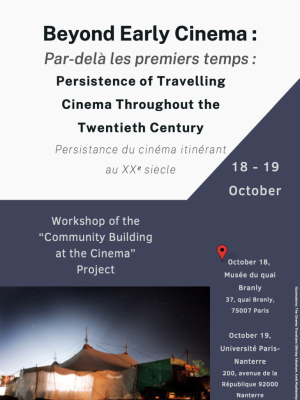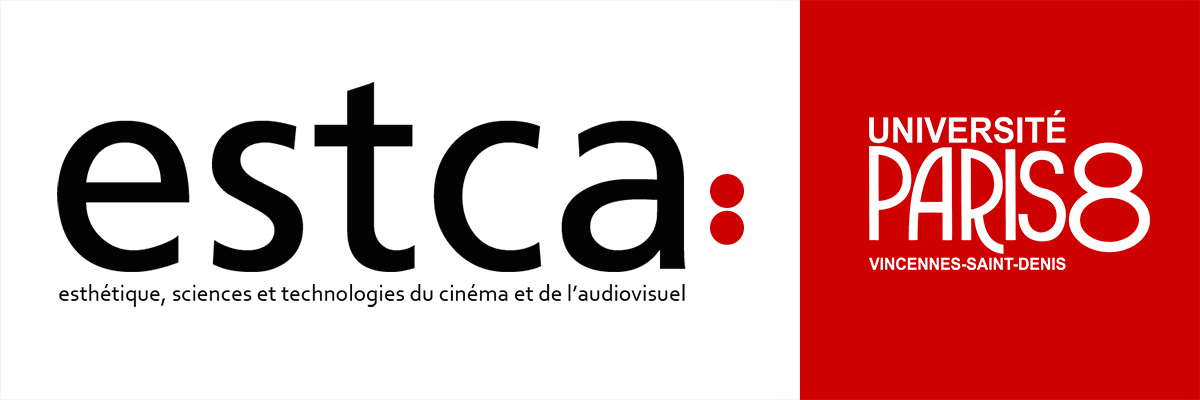Infos
Date :
18 et 19 octobre 2022
Titre :
Par-delà les premiers temps
Projection au Musée du quai Branly
Atelier à l’Université Paris Nanterre

Organisé par Morgan Corriou, Caroline Damiens, Mélisande Leventopoulos
Avec la collaboration de Nolwenn Briand (University of Reims Champagne-Ardenne)
Projet financé par la ComUE UPL dans le cadre de son appel à projets 2022.
Ce travail a bénéficié d’une aide de l’Etat gérée par l’Agence nationale de la recherche au titre du programme d’Investissements d’avenir portant la référence ANR-17-EURE-0008.
Détail du programme
18 et 19 octobre 2022
Salle de cinéma du Musée du Quai Branly
17:00 Projection de « The Cinema Travellers » (Shirley Abraham & Amit Madheshiya, India, 2016, 96 min) Entrée libre, dans la limite des places disponibles.
Université Paris-Nanterre, Bâtiment Weber, salle 2
9:30 Welcoming coffee Café, Accueil
9:45 Introduction by Morgan Corriou (Paris 8), Caroline Damiens (Paris Nanterre), Mélisande Leventopoulos (Paris 8)
— Judith Thissen (Utrecht University): “Towards a Typology of Travelling Cinema”
10:45 Coffee Break Pause
11:00 Travelling cinema experiences in socialist spaces
— Thomas Lahusen (University of Toronto): “From Moscow to Local Community: Soviet Travelling Cinema in Riazan and Kyrgyzstan”
— Ningsi Song (Université Aix-Marseille): “Travelling Cinema Practices in Rural China during the Cultural Revolution (1970-1976)”
— Jonathan Larcher (Université Paris-Nanterre): “Distant Echoes. Memories of Travelling Projections in Socialist Romania (1980-1990)”
12:30 Lunch Déjeuner
14:30 Institutions of travelling cinema after the Second World War
— Ian Goode (University of Glasgow): “Mobile Cinema and Cinema-Going in the Post-War Highlands and Islands of Scotland”
— Katerina Loukopoulou (Middlesex University London): “The Viewing Dispositifs of the Marshall Plan: the Case of a Showboat’s Travelling Cinema”
15:30 Coffee Break Pause
16:00 Interpreting audiences of travelling cinema
— Asa Jernudd (Örebro University): “Elite, Urban and Simpleminded Rural Cinema Cultures in 1960s Sweden: Challenging a Historical Stereotype with a Case Study of the Travelling Cinema Skandia Bio”
— Vincent Bouchard (Indiana University Bloomington): “Film Propaganda and Audience Reception in Colonial Algeria: The SDC”
— Paul S. Moore (Toronto Metropolitan University): “Small-Gauge in the Great White North: A Critique of Canadian Government Data on Itinerant 16mm Exhibitors, 1938- 1976”
17:30 Concluding Remarks
— Arthur Asseraf (University of Cambridge, visiting professor for the project “Community Building at the Cinema”)
Entrée libre dans la limite des places disponibles.
Musée du quai Branly
37, quai Branly 75007 Paris
Métro : Alma-Marceau, Iéna (9), Ecole Militaire (8), Bir Hakeim (6), Pont de l’Alma, Champ de Mars-Tour Eiffel (RER C)
Université Paris Nanterre
200, avenue de la République 92000 Nanterre
Train: Nanterre Université (RER A, ligne L depuis Saint -Lazare)
Cliquer ici pour télécharger le programme de l’atelier en pdf.

